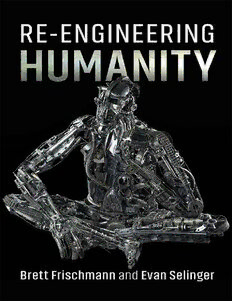Table Of ContentRE- ENG INEERING HUM ANIT Y
Every day new warnings emerge about artificial intelligence rebelling
against us. All the while, a more immediate dilemma flies under the
radar. Have forces been unleashed that are thrusting humanity down
an ill-advised path, one that’s increasingly making us behave like
simple machines?
In this wide-reaching, interdisciplinary book Brett Frischmann and
Evan Selinger examine what’s happening to our lives as society
embraces big data, predictive analytics, and smart environments.
They explain how the goal of designing programmable worlds goes
hand in hand with engineering predictable and programmable people.
Through new frameworks, provocative case studies, and mind-
blowing thought experiments that you’ll find hard to shake,
Frischmann and Selinger reveal hidden connections between fitness
trackers, GPS technology, electronic contracts, social media
platforms, robotic companions, fake news, and autonomous cars.
The powerful analysis provides much-needed resources for imagining
and building alternative futures.
is The Charles Widger Endowed University
BRETT FRISCHMANN
Professor in Law, Business and Economics at Villanova University. He
is also an affiliated scholar of the Center for Internet and Society at
Stanford Law School, and a trustee for the Nexa Center for Internet
& Society, Politecnico di Torino. He has published foundational books
on the relationships between infrastructural resources, governance,
commons, and spillovers, including Governing Medical Knowledge
Commons, with Michael Madison and Katherine Strandburg
(Cambridge, 2017); Governing Knowledge Commons, with Michael
Madison and Katherine Strandburg (2014); and Infrastructure: The
Social Value of Shared Resources (2012).
is Professor of Philosophy at the Rochester Institute
EVAN SELINGER
of Technology, where he is also the Head of Research
Communications, Community, and Ethics at the Center for Media,
Arts, Games, Interaction, and Creativity. A Senior Fellow at the
Future of Privacy Forum, his primary research is on the ethical and
privacy dimensions of emerging technology. Selinger has co-
edited The Cambridge Handbook of Consumer Privacy, with
Jules Polontesky and Omer Tene (Cambridge, 2018). A strong
advocate of public philosophy, he regularly writes for magazines,
newspapers, and blogs, including The Guardian, The Atlantic, Slate,
and Wired.
“Frischmann and Selinger deftly and convincingly show why we should
be less scared of robots than of becoming more robotic, ourselves.
This book will convince you why it’s so important we embed
technologies with human values before they embed us with their
own.”
Douglas Rushkoff, author of Present Shock, Program or Be
Programmed, and Throwing Rocks at the Google Bus
“Everybody is suddenly worried about technology. Will social media
be the end of democracy? Is automation going to eliminate jobs? Will
artificial intelligence make people obsolete? Brett Frischmann and
Evan Selinger boldly propose that the problem isn’t the rise of ‘smart’
machines but the dumbing down of humanity. This refreshingly
philosophical book asks what’s lost when we outsource our decision-
making to algorithmic systems we don’t own and barely understand.
Better yet, it proposes conceptual and practical ways to reclaim our
autonomy and dignity in the face of new forms of computational
control.”
Astra Taylor, author of The People’s Platform: Taking Back Power
and Control in the Digital Age
R E- ENGI NEER I NG
H U MANI T Y
Brett Frischmann
Villanova University
Evan Selinger
Rochester Institute of Technology
University Printing House, Cambridge CB2 8BS, United Kingdom
One Liberty Plaza, 20th Floor, New York, NY 10006, USA
477 Williamstown Road, Port Melbourne, VIC 3207, Australia
314–321, 3rd Floor, Plot 3, Splendor Forum, Jasola District Centre, New
Delhi – 110025, India
79 Anson Road, #06–04/06, Singapore 079906
Cambridge University Press is part of the University of Cambridge.
It furthers the University’s mission by disseminating knowledge in the
pursuit of education, learning, and research at the highest international
levels of excellence.
www.cambridge.org
Information on this title: www.cambridge.org/9781107147096
DOI: 10.1017/9781316544846
© Brett Frischmann and Evan Selinger 2018
This publication is in copyright. Subject to statutory exception and to the
provisions of relevant collective licensing agreements, no reproduction of any
part may take place without the written permission of Cambridge University
Press.
First published 2018
Printed in the United States of America by Sheridan Books, Inc.
A catalogue record for this publication is available from the British
Library.
ISBN 978-1-107-14709-6 Hardback
Cambridge University Press has no responsibility for the persistence or
accuracy of URLs for external or third-party internet websites referred to in this
publication and does not guarantee that any content on such websites is, or will
remain, accurate or appropriate.
To our families
Contents
Foreword by Nicholas Carr
Acknowledgments
Note on the Text
Introduction
Part I
1. Engineering Humans
2. Cogs in the Machine of Our Own Lives
3. Techno-Social Engineering Creep and the Slippery-
Sloped Path
Part II
4. Tools for Engineering Humans
5. Engineering Humans with Contracts
6. On Extending Minds and Mind Control
7. The Path to Smart Techno-Social Environments
8. Techno-Social Engineering of Humans through Smart
Environments
9. #RelationshipOptimization
Part III
10. Turing Tests and the Line between Humans and
Machines
11. Can Humans Be Engineered to Be Incapable of
Thinking?
12. Engineered Determinism and Free Will
13. To What End?
Part IV
14. Conclusion: Reimagining and Building Alternative
Futures
Appendices
Appendix A. Mass Media and the First Amendment
Appendix B. Perspectives on the Turing Test
Appendix C. Our Free Will Discussion
Appendix D. Modern Meal Times

